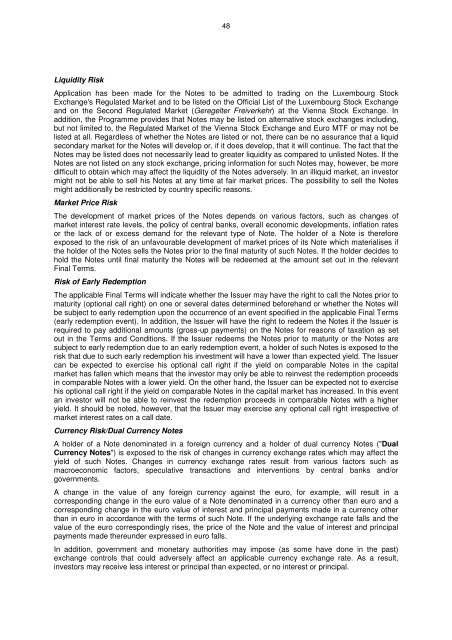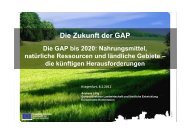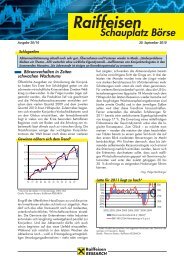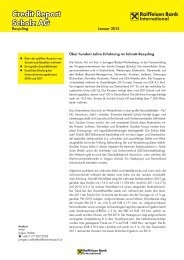RAIFFEISENLANDESBANK NIEDERÖSTERREICH-WIEN AG
RAIFFEISENLANDESBANK NIEDERÖSTERREICH-WIEN AG
RAIFFEISENLANDESBANK NIEDERÖSTERREICH-WIEN AG
Create successful ePaper yourself
Turn your PDF publications into a flip-book with our unique Google optimized e-Paper software.
Liquidity Risk<br />
48<br />
Application has been made for the Notes to be admitted to trading on the Luxembourg Stock<br />
Exchange's Regulated Market and to be listed on the Official List of the Luxembourg Stock Exchange<br />
and on the Second Regulated Market (Geregelter Freiverkehr) at the Vienna Stock Exchange. In<br />
addition, the Programme provides that Notes may be listed on alternative stock exchanges including,<br />
but not limited to, the Regulated Market of the Vienna Stock Exchange and Euro MTF or may not be<br />
listed at all. Regardless of whether the Notes are listed or not, there can be no assurance that a liquid<br />
secondary market for the Notes will develop or, if it does develop, that it will continue. The fact that the<br />
Notes may be listed does not necessarily lead to greater liquidity as compared to unlisted Notes. If the<br />
Notes are not listed on any stock exchange, pricing information for such Notes may, however, be more<br />
difficult to obtain which may affect the liquidity of the Notes adversely. In an illiquid market, an investor<br />
might not be able to sell his Notes at any time at fair market prices. The possibility to sell the Notes<br />
might additionally be restricted by country specific reasons.<br />
Market Price Risk<br />
The development of market prices of the Notes depends on various factors, such as changes of<br />
market interest rate levels, the policy of central banks, overall economic developments, inflation rates<br />
or the lack of or excess demand for the relevant type of Note. The holder of a Note is therefore<br />
exposed to the risk of an unfavourable development of market prices of its Note which materialises if<br />
the holder of the Notes sells the Notes prior to the final maturity of such Notes. If the holder decides to<br />
hold the Notes until final maturity the Notes will be redeemed at the amount set out in the relevant<br />
Final Terms.<br />
Risk of Early Redemption<br />
The applicable Final Terms will indicate whether the Issuer may have the right to call the Notes prior to<br />
maturity (optional call right) on one or several dates determined beforehand or whether the Notes will<br />
be subject to early redemption upon the occurrence of an event specified in the applicable Final Terms<br />
(early redemption event). In addition, the Issuer will have the right to redeem the Notes if the Issuer is<br />
required to pay additional amounts (gross-up payments) on the Notes for reasons of taxation as set<br />
out in the Terms and Conditions. If the Issuer redeems the Notes prior to maturity or the Notes are<br />
subject to early redemption due to an early redemption event, a holder of such Notes is exposed to the<br />
risk that due to such early redemption his investment will have a lower than expected yield. The Issuer<br />
can be expected to exercise his optional call right if the yield on comparable Notes in the capital<br />
market has fallen which means that the investor may only be able to reinvest the redemption proceeds<br />
in comparable Notes with a lower yield. On the other hand, the Issuer can be expected not to exercise<br />
his optional call right if the yield on comparable Notes in the capital market has increased. In this event<br />
an investor will not be able to reinvest the redemption proceeds in comparable Notes with a higher<br />
yield. It should be noted, however, that the Issuer may exercise any optional call right irrespective of<br />
market interest rates on a call date.<br />
Currency Risk/Dual Currency Notes<br />
A holder of a Note denominated in a foreign currency and a holder of dual currency Notes ("Dual<br />
Currency Notes") is exposed to the risk of changes in currency exchange rates which may affect the<br />
yield of such Notes. Changes in currency exchange rates result from various factors such as<br />
macroeconomic factors, speculative transactions and interventions by central banks and/or<br />
governments.<br />
A change in the value of any foreign currency against the euro, for example, will result in a<br />
corresponding change in the euro value of a Note denominated in a currency other than euro and a<br />
corresponding change in the euro value of interest and principal payments made in a currency other<br />
than in euro in accordance with the terms of such Note. If the underlying exchange rate falls and the<br />
value of the euro correspondingly rises, the price of the Note and the value of interest and principal<br />
payments made thereunder expressed in euro falls.<br />
In addition, government and monetary authorities may impose (as some have done in the past)<br />
exchange controls that could adversely affect an applicable currency exchange rate. As a result,<br />
investors may receive less interest or principal than expected, or no interest or principal.
















